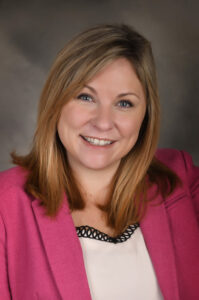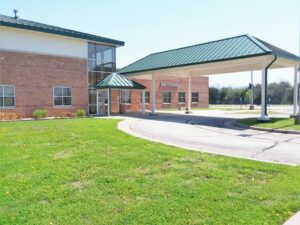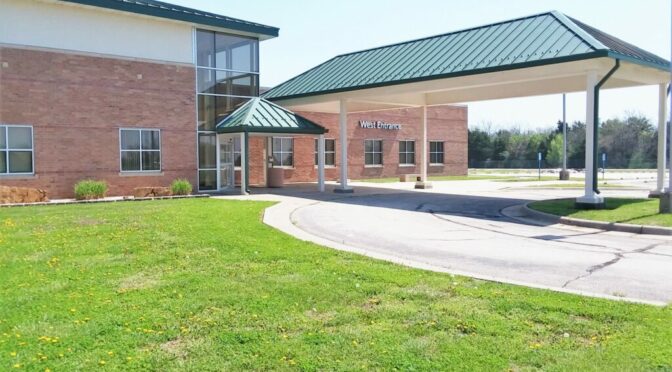
Bourbon County Economic Director Jody Hoener is working on securing leases in the former Mercy Hospital building on Fort Scott’s south end, in hopes of providing the county with a medical mall.
A medical mall is a facility offering comprehensive ambulatory medical services such as primary and secondary care, diagnostic procedures, outpatient surgery, and rehabilitation, except the overnight beds, according to merriam-webster.com.
“Bourbon County demographics show proportionately more elderly, more children living in poverty, lower incomes, and more chronic health conditions,” Hoener said. ” In addition, our community recently felt the impact of fewer health services (with the closing of Mercy Hospital in 2018). Rural health systems can overcome these challenges by creating linkages and efficiencies.”
“Access to robust and diverse health services is much more than a quality of life issue,” she said. “A vigorous and thriving health care system is essential not only for public health and welfare, but to enhance economic opportunity as well.”
Health organizations that currently have a part in Bourbon County health care have shown interest.
“We are currently working on leases with Community Health Centers of Southeast Kansas and Ascension Via Christi,” she said. “These leases will be ten-year long-term contracts,” she said. “Fort Scott Community College Nursing program will also be leasing space through an inter-local agreement.”
Other entities have “paused” conversations.
“Although we have been in talks with additional healthcare providers to occupy space, the COVID-19 pandemic has paused much of these conversations.,” Hoener said. “Recruitment activities will be a high priority with a goal of one additional anchor tenant in the next 3-5 years.”
The combined operation of many entities under one roof provides financial benefits to each involved, Hoener believes.
“The healthcare mall addresses many challenges local providers face in an innovative approach, creating synergy within the four walls, that will help each organization’s bottom line,” she said. ” In general, there are fewer healthcare providers in rural areas, and they operate on very thin profit margins. When compared to urban communities, our local health providers face unique challenges.”
Bourbon County’s vision for the community:
“Our vision is a healthy, safe, and thriving Bourbon County.,” she said. “A strong health care system is a critical piece of any community’s vitality and sustainability.”
The healthcare industry impacts the local economy.
“The healthcare industry is rapidly changing and has the potential to greatly impact access to these services in the future, ” Hoener said.
“Through the healthcare mall, we are becoming proactive in maintaining high-quality local health care services. In addition to health outcomes, healthcare services have shown to have an impact on:
- Attracting and maintaining business and industry growth
- Attracting and retaining retirees
- Creating higher-paying jobs in a growing sector
- Contributing to public finances, supporting essential public services”
” Americans are spending more dollars on healthcare,” Hoener said. “In 1970 healthcare costs accounted for 7.0 percent of the GDP. In 2017, Americans spent $3.5 trillion on healthcare, or 18.0 percent of the GDP. The projected GDP is 19.4 percent by 2027 (Kansas Health Association, 2019). Capturing a share of this economic growth will only help our community.”
“When residents spend health care dollars elsewhere, rather than purchasing the service locally, it can have a negative economic impact and result in loss of dollars within our local community,” she said. “Out of town trips to obtain healthcare services naturally offer opportunities to spend dollars outside of town that may have been spent locally.”
“Nationwide, employment in healthcare services increased 92 percent from 1990 to 2015. For Bourbon County, in 2017, health services ranked number 3 in terms of employment,” she said. ” Also, in 2017, the health care sector’s impact on retail sales was $19,308,000, county sales tax impact of $270,000, and a total impact of $65,378,000. (Kansas Health Association, 2017).”
“Industry and business leaders look for good health and education services when making location decisions,” Hoener said. “They also want to ensure the local labor force will meet their needs.”
” Attracting and maintaining retirees is also important as this is a special group of residents whose spending can provide a significant source of income for the local economy.”


Yes, I agree with the concept of the health care mall. I also believe we need better quality and quantity of screening, diagnostic and prevention of chronic illnesses such as cancer, heart disease, diabetes, obesity, depression and anxiety.
Yes we need health care but can bourbon county afford to keep this building if all spaces are not leased?
Hope it does work out.
Using 2017 numbers for Bourbon County is almost like using a 10 year old Highway map looking for 71 highway to get from Kansas City to Joplin – you MIGHT get there just going to take longer. The real answer is hidden in the statement “Attracting and maintaining retirees.” Because 65 and older have Medicare to pay the bill for healthcare (for the most part at least 80/20….). Maintaining? Living longer? Not aggravating us to the point of jumping off a bridge with higher sales tax, property tax, fees, etc. The equation truth is rural health sunk when Brownback sold that bill of goods that eliminated Medicaid by inciting those with means that providing healthcare as a right was somehow impacting their liberties. If Medicaid expansion is not passed in the Kansas Congress quickly rural healthcare will be non-existent and those 10 year lease payments will not be made. No human should be denied healthcare based on an inability to pay and the larger the population to share costs reasonably is obvious. The unknown factor impacting all sectors of our cost sharing systems is income disparity – “lower income averages in rural areas” no kidding! Then an income disparity equalization mechanism must be put into place, today that mechanism is MEDICAID. Just do it!